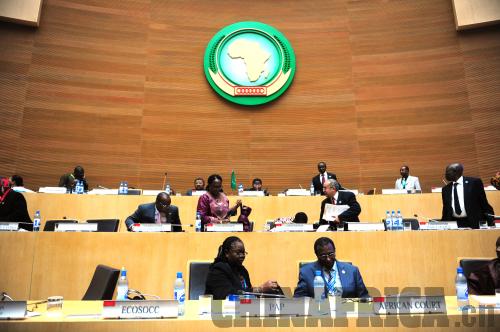|
 |
|
NEW HQ:AU delegates take their seats at the 18th Summit (DING HAITAO) |
Timetable
The process of African economic integration can be roughly divided into two phases. The period from the 1960s to the end of the 1980s marks the first phase. From the 1960s to the 1970s, many sub-regional economic integration organizations began to appear. Most of the existing 14 African regional integration organizations were established during that period, and have been gradually evolved into the current ones. But due to various reasons, the substantial progress of integration was quite slow.
Since the 1990s, the integration process has accelerated and entered into the second phase. At the 27th Summit of the Organization of African Unity in June 1991, African leaders signed the African Economic Community (AEC) Treaty (also referred to as the Abuja Treaty), and decided to set up the AEC. According to the treaty, the member states should make joint efforts to realize free trade in their regions first, then set up free trade area and customs union, and ultimately establish the African common market. The whole process will last 34 years, which is divided into six phases, and it will be finally completed by 2028, and no later than 2034.
The East African Community (EAC) was formed in 1967 by Kenya, Uganda and Tanzania and has helped trade among the three increase significantly. For example, the export from Uganda to Kenya soared from $14 million in 2004 to $98 million in 2007.
In addition, the most encouraging news for Africa is that three regional organizations, which comprise the Common Market for Eastern and Southern Africa, the EAC, and the Southern African Development Community, announced to start the negotiation of Africa's biggest free trade area, and proposed to realize free trade of goods among the three organizations within three years at a summit in South Africa last June. The three organizations cover a total of 26 countries from Egypt to South Africa, with a population of 600 million, and their gross national product accounts for 57 percent of Africa's economic aggregate. Therefore, if the three organizations can take the lead in achieving free trade, the process of African economic integration will be greatly accelerated. Thus, the goal of establishing a continental free trade area by 2017, which was set at the 18th AU Summit, can be achieved.
Challenges ahead
The challenges for African integration construction first come from the political and security issues. Over the past year, Africa witnessed complicated and profound changes, such as the civil war in Côte d'Ivoire, the independence of South Sudan, the war in Libya and the unrest in North Africa. Although the AU made unremitting efforts to cope with the crises and challenges, due to the strong intervention of the Western powers and limitations of the AU's own resources and capabilities, the AU suffered a setback in its efforts to solve problems in the African way, and AU's role was even in the danger of being marginalized. In 2012, as many as 25 African countries will hold elections at either the presidential, legislative or local level. How to maintain peace and stability in Africa and how to increase the AU's capabilities to resolve their own crises independently, marks an important political and security premise for the progress of African economic integration.
Secondly, African integration is also facing various development constraints and bottlenecks, such as the imbalanced development among different regions and countries, the overlapping of various sub-regional organizations, and especially poor infrastructure. At the 18th AU Summit, African leaders also endorsed the launch of the Program for Infrastructure Development in Africa. The program invites international organizations, partner countries and private investors to take an active part in Africa's infrastructure development, and the parties involved are expected to make promises to implement a number of cross-border or inter-regional projects.
Finally, it's particularly worth mentioning that the 18th AU Summit was convened in the newly completed AU Conference Center built with Chinese aid (with the total investment of 800 million yuan, about $123.7 million). The Chinese delegation headed by Jia Qinglin, Chairman of the National Committee of the Chinese People's Political Consultative Conference, also attended the Summit. Jia announced that China would provide a total of 600 million yuan ($95.2 million) free assistance to the AU in the next three years. Given the good prospects of the Chinese economy, China continues to expand the economic and trade cooperation with Africa, and increase the investment to facilitate African integration. This not only demonstrates China's full support and confidence about AU and African integration, but also supports Africa to cope with the global economic downturn and other challenges.
(The author is the director of the African Studies Department at the Institute of West-Asian and African Studies under the Chinese Academy of Social Sciences) |